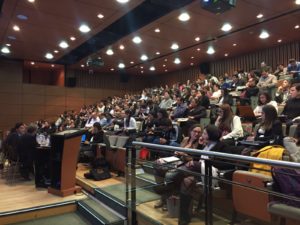
Search
Posts con la etiqueta ‘Colombia’
Seminar focuses on “MPI: its impact on social policy in Colombia”
Then Nemesio Roys presented how the DPS uses the information provided by the MPI to redistribute resources and prioritise social policies at the local level. Also, how the MPI has been calculated with the objective to target multidimensional poor households so that they can get access to strategies to reduce poverty in Colombia.
After this presentation a panel of experts took place. The panellists included Mauricio Perfetti, Luis Fernando Mejia, Nemesio Roys and Roberto Angulo. Sabina Alkire was the moderator. The panel started with the intervention of Mauricio Perfetti, who discussed how the process of calculating the MPI has been and how transparency plays a major role. He mentioned the existence of an experts committee, which has a main task to validate the methodology and to guarantee the transparency of the figures.
In addition, Perfetti mentioned the importance of having a multidimensional poverty measure at the international level. In this context, Colombia is one of the few countries to have presented a report were the MPI was explicitly mentioned as a tool to monitor social policy to fulfil the Sustainable Development Goals. The next panellist was Luis Fernando Mejía, who presented how the MPI has been articulated to the National Development Plan and is an instrument to facilitate the design of social policies in Colombia. He also mentioned some of the challenges that the MPI has had in the country, some of which are related to the representativeness of the results and how it does not reveal what happens at the local level. As a consequence the DNP has calculated an MPI using data from the SISBEN (survey to targeting beneficiaries of social programmes).

The presentation of Nemesio Roys highlighted how Colombia has used the MPI to design programmes to respond to the specific needs of the population, he also emphasised the need for the MPI to be calculated over time and be resistant to changes in government.
Finally Roberto Angulo discussed some of the reasons why the MPI in Colombia has had a positive effect on social policy, and this is mainly by the inclusion of the MPI in the National Development Plan. Angulo also mentioned how effective Colombia has been in the reduction of multidimensional poverty and that the MPI has facilitated the design of policies that aim to reduce poverty in different dimensional aspects that has improved the work between various public sectors.












Recent Comments